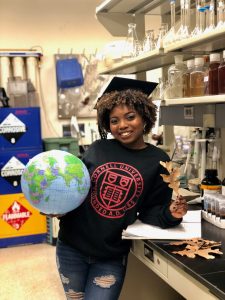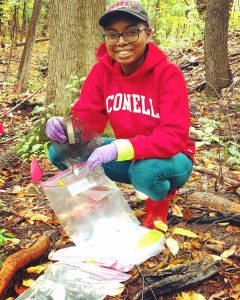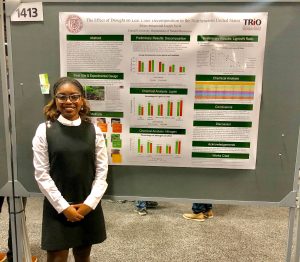August 27, 2019
Women’s Equality Week Q&A with Alexis Wilson
Posted by Caitlin Bergstrom
 August 26th is Women’s Equality Day. To celebrate women’s contributions to Earth and space science, we’re devoting this week to featuring Q&As with inspirational women in STEM. #WomensEqualityDay!
August 26th is Women’s Equality Day. To celebrate women’s contributions to Earth and space science, we’re devoting this week to featuring Q&As with inspirational women in STEM. #WomensEqualityDay!
Today, we’re excited to feature Alexis Wilson, who is starting her PhD in Earth System Science at Stanford University. Alexis received her B.S. in Environmental and Sustainability Sciences from Cornell University. Find Alexis online, on Twitter, @DrAlexisWilson, and on Instagram, @alexis_m_wilson.
What inspired you to become a scientist?
There wasn’t one particular moment, I was always interested in science at a young age. I started by doing science fair projects at school. Then, when I was about nine, I got really interested in forensic science so my mom sent me to forensic science camp. My mom actually bought me my first personal microscope.
In high school, I had experiences that were instrumental in finding my passion for environmental science. I was first introduced to environmental science by my biology teacher, Mr. Katz. He focused his course on environmental science and had us build our own aquaponics system. From there, I became increasingly interested in environmental science and research. My first summer research experience was at the University of Illinois Urbana-Champaign, where I got to work on a research project with a lab group and presented at the end of the summer. From there, I was hooked on environmental research, and that’s how I decided to major in it in college.
Have you faced any barriers on your path to your current position?

Starting further back, forensic science camp was my first time away from home. I was only nine, and I was the only black girl at the camp. There were a few other girls, but there weren’t any other black girls there. That was my first time realizing that there weren’t many other people like me in the scientific world. As I got older, I didn’t see a lot of representation of women, particularly black women, in science. That discouraged me because I didn’t think I could do it.
I also lacked access to resources and opportunities. I grew up on the South Side of Chicago, a predominantly black area, so there weren’t many opportunities or resources for me to pursue science. I was really lucky my mom found me that forensic science camp, but it was expensive and far from home. That kind of opportunity was a luxury that I wish more kids had a chance to experience.
Finally, I’ve had a lot of self-doubt and imposter syndrome. I’ve thought, “can I do this?” because there aren’t many people that look me doing earth and environmental science. “Am I smart enough?” I had to push past that and realize I am good enough, smart enough, and capable enough to do this. My mentors and peers have helped tremendously with gaining that confidence.
Who have been your mentors?
I’ve had many mentors, but some of my more impactful ones would be my eighth grade science teacher, Mrs. Germino, who was the first woman to encourage me to do science, and there was also my biology teacher in high school, Mr. Katz. In college, I had a variety of mentors. It was important for me to find mentors in different spaces that could help me with different needs. I had my lab PI, Dr. Joseph Yavitt. I worked in his lab all four years of college. He helped me a lot with the professional and scientific side of my career. I had another mentor, Dr. Adi Grabiner-Keinan; we worked on a lot of social justice causes together. I also had student mentors through peer mentorship groups, and mentees through those same programs. Finally, I had a lab manager, Dr. Suzanne Pierre, who became my first black woman scientist mentor.
What advice would you give to those aspiring to work in science?
Find something you’re passionate about. The reason behind that is when the work gets difficult, your passion is what’s going to keep you going.
Find mentors and a support system. I used to try to do everything on my own, then I realized I was making my life harder than it needed to be. So, find mentors and a support system as soon as you can, and then be a mentor for others when you feel ready.
Another piece of advice: prepare for mistakes, failures, and rejection because they’re going to happen. Failure doesn’t mean you’re not capable of doing the work, it’s just a natural part of the scientific process. And rejection doesn’t always mean that you’re not qualified or that you’re not smart enough. Take rejection as a stepping stone to your next big thing.
Find out your “why.” Don’t just find something you’re passionate about, but ask why you’re doing what you’re doing, and how does it make a positive impact?
A big part of why I started my professional Twitter and personal website is that I really hope that I can be an inspiration to young girls and women like me, especially young black girls and women of color who don’t see themselves represented in science. I want to be a part of getting more girls involved in science. That’s my biggest hope for my career, that I can really make a positive change in the world and that I can empower younger generations to pursue their dreams.

